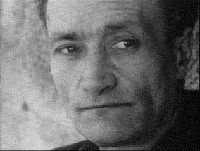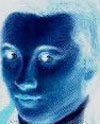THE NOVALIS COMPLEX
Georg Philipp Friedrich von Hardenberg
"The blue flower is also red [...]" --Gaston Bachelard
 BRETON, RE ARTAUD BY WAY OF NOVALIS - "Each time I happen to recall -- nostalgically -- the surrealist rebellion as expressed in its original purity and intransigence, it is the personality of Antonin Artaud that stands out in dark magnificence, it is a certain intonation in his voice that injects specks of gold into his whispering voice ... [...] I know that Antonin Artaud saw, the way Rimbaud, as well as Novalis and Arnim before him, had spoken of seeing. It is of little consequence, ever since the publication of [Gérard de Nerval's] Aurélia [1855], that what was seen this way does not coincide with what is objectively visible. The real tragedy is that the society to which we are less and less honored to belong persists in making it an inexpiable crime to have gone over to the other side of the looking glass." -- André Breton, "A Tribute to Antonin Artaud", in Free Rein, cited in Jacques Derrida and Paule Thévenin, The Secret Art of Antonin Artaud (Cambridge, MA: MIT Press, 1998)
BRETON, RE ARTAUD BY WAY OF NOVALIS - "Each time I happen to recall -- nostalgically -- the surrealist rebellion as expressed in its original purity and intransigence, it is the personality of Antonin Artaud that stands out in dark magnificence, it is a certain intonation in his voice that injects specks of gold into his whispering voice ... [...] I know that Antonin Artaud saw, the way Rimbaud, as well as Novalis and Arnim before him, had spoken of seeing. It is of little consequence, ever since the publication of [Gérard de Nerval's] Aurélia [1855], that what was seen this way does not coincide with what is objectively visible. The real tragedy is that the society to which we are less and less honored to belong persists in making it an inexpiable crime to have gone over to the other side of the looking glass." -- André Breton, "A Tribute to Antonin Artaud", in Free Rein, cited in Jacques Derrida and Paule Thévenin, The Secret Art of Antonin Artaud (Cambridge, MA: MIT Press, 1998)DERRIDA, RE ARTAUD BY WAY OF NERVAL - "Necessity of a logomachy. That is to say beyond the becalmed politeness of a cultured language, the war with words, the drilling and maddened destruction of a language policing and reigning over its subjectiles. In this conflagration of words, against words, the guardians of language will denounce a logomachy; they will require that discourse conform to pedagogy and philosophy, indeed to dialectic. But logomachy aims at taking breath back from them, in a war of reconquest." --Jacques Derrida, "To Unsense the Subjectile", in The Secret Art of Antonin Artaud (Cambridge, MA: MIT Press, 1998)
SELECT BOOKS / IN ENGLISH

2/ Andrew Bowie, Aesthetics and Subjectivity (Manchester: Manchester University Press, 2003)
 3/ Friedrich von Hardenberg, Jane Kneller (trans), Novalis: Fichte Studies (Cambridge: Cambridge University Press, 2003)
3/ Friedrich von Hardenberg, Jane Kneller (trans), Novalis: Fichte Studies (Cambridge: Cambridge University Press, 2003)4/ Géza von Molnár, Jochen Schulte-Sasse (foreword), Romantic Vision, Ethical Context: Novalis and Artistic Autonomy (Minneapolis: University of Minnesota Press, 1991)
 5/ Jochen Schulte-Sasse et alia, Theory as Practice: A Critical Anthology of Early German Romantic Writings (Minneapolis: University of Minnesota Press, 1997)
5/ Jochen Schulte-Sasse et alia, Theory as Practice: A Critical Anthology of Early German Romantic Writings (Minneapolis: University of Minnesota Press, 1997)For publisher details / links, see Books / Texts
OUTTAKES / WWW
 German Idealism Calling
German Idealism Calling"Osokin looks round, and suddenly an extraordinarily vivid sensation sweeps over him that, if he were not there, everything would be exactly the same." -- Petr Demianovich Uspenskii, Strange Life of Ivan Osokin (1947)
 1/ Unauthorized translation of Novalis' Hymns to the Night by George MacDonald (c.1897)
1/ Unauthorized translation of Novalis' Hymns to the Night by George MacDonald (c.1897)2/ Extra, Extra, Extra - Novalis, Novalis, Novalis (Leipzig University)
3/ Novalis' Fichte Studies (as above) - "This volume presents the first complete translation of Fichte Studies, a powerful, creative and sustained critique of Fichtean philosophy by the young philosopher-poet Friedrich von Hardenberg, who under the pen-name Novalis went on to become the most well-known and beloved of the early German Romantic writers. Anyone interested in the fate of German philosophy and literature immediately after Kant will find this collection of notes and aphorisms a treasure-trove of original contributions on the nature of self-consciousness, the relation of art to philosophy, and the nature of philosophical inquiry. There are also the beginnings of a strikingly contemporary-sounding semiotic theory. The text is translated by Jane Kneller, who also provides an introduction situating the Fichte Studies in the context of Novalis’ life and work." (Cambridge University Press)
4/ Ibid. - Fichteana (North American Fichte Society)
 MIXED NOTES - The links from Novalis (and High Romanticism) to Post-Structuralism have to do with the idea that representation is in fact an inter-subjective some-thing that points always back to the subject versus the object. Language and art (as complex) becomes a sublime "inter-discursive translation" for Novalis, instead of a prison-house. The passage from Novalis to Post-Structuralism is marked from Pierce to Jakobson to Barthes ... Or, from Structuralism (linguistics) to Post-Structuralism (contextualized discursive praxis) by way of Symbolism (poetic image as hieroglyph). Novalis was primarily re-working Fichtean idealism (A=A, I=I, etc.), without the dogmatic Absolute (A=A, I=I) as the end result. He confirms that Kantian "transcendental apperception" (everything known that is not of the object) is, in fact, as others have indicated, "backed up" by language (every thought is informed by another language, or circles back to an ur-language). Hence Novalis' poetical sublime language games that combine Theoretical Reason and The Categorical Imperative (without becoming merely moralistic). Here, "Theoretical Reason" (the horizon of the world) and "The Categorical Imperative" (the conceptual horizon of subjective idealism) merge in poesie (poesie = écriture + 'the way out'). Hence the intense inner-focussed transcendental aesthetic that was brought into French and Russian Symbolism (by way of American Transcendentalism?), and also taken up by semioticians and, later, post-structuralists. Novalis fused art and philosophy by way of a poetic negative dialectic leading back to the primordial concept of Self, versus the idea of Ego (nicht-Ich, versus Ich). This is the subject-object divide deconstructed, wherein the object is "a being outside of being within being". Kant's gift, "the idea of the autonomous nature of artistic production", is, therein, investigated for signs of Some-thing Else. This all leads to a universal, revolutionary aesthetic. See "Logologische Fragmente" (1798). --Extracted from Géza von Molnár's Romantic Vision, Ethical Context: Novalis and Artistic Autonomy (Minneapolis: University of Minnesota Press, 1987/1991), and Novalis Fichte Studies: The Foundations of His Aesthetics (The Hague: Mouton, 1970)
MIXED NOTES - The links from Novalis (and High Romanticism) to Post-Structuralism have to do with the idea that representation is in fact an inter-subjective some-thing that points always back to the subject versus the object. Language and art (as complex) becomes a sublime "inter-discursive translation" for Novalis, instead of a prison-house. The passage from Novalis to Post-Structuralism is marked from Pierce to Jakobson to Barthes ... Or, from Structuralism (linguistics) to Post-Structuralism (contextualized discursive praxis) by way of Symbolism (poetic image as hieroglyph). Novalis was primarily re-working Fichtean idealism (A=A, I=I, etc.), without the dogmatic Absolute (A=A, I=I) as the end result. He confirms that Kantian "transcendental apperception" (everything known that is not of the object) is, in fact, as others have indicated, "backed up" by language (every thought is informed by another language, or circles back to an ur-language). Hence Novalis' poetical sublime language games that combine Theoretical Reason and The Categorical Imperative (without becoming merely moralistic). Here, "Theoretical Reason" (the horizon of the world) and "The Categorical Imperative" (the conceptual horizon of subjective idealism) merge in poesie (poesie = écriture + 'the way out'). Hence the intense inner-focussed transcendental aesthetic that was brought into French and Russian Symbolism (by way of American Transcendentalism?), and also taken up by semioticians and, later, post-structuralists. Novalis fused art and philosophy by way of a poetic negative dialectic leading back to the primordial concept of Self, versus the idea of Ego (nicht-Ich, versus Ich). This is the subject-object divide deconstructed, wherein the object is "a being outside of being within being". Kant's gift, "the idea of the autonomous nature of artistic production", is, therein, investigated for signs of Some-thing Else. This all leads to a universal, revolutionary aesthetic. See "Logologische Fragmente" (1798). --Extracted from Géza von Molnár's Romantic Vision, Ethical Context: Novalis and Artistic Autonomy (Minneapolis: University of Minnesota Press, 1987/1991), and Novalis Fichte Studies: The Foundations of His Aesthetics (The Hague: Mouton, 1970)RECENT TITLES (ENGLISH) - Veronica Freeman, The Poetization of Mystical Constructs in the Work of Novalis (New York: Peter Lang, 2006) - Cloth, ISBN 0-820-47865-2 / Irena Nikolova, Complementary Modes of Representation in Keats, Novalis, and Shelley (New York: Peter Lang, 2001) - Cloth, 209 pages, ISBN: 0-820-45239-4 / Margaret M. Stoljar, Novalis: Philosophical Writings (Albany: SUNY, 1997) - Cloth, 128 pages, ISBN 0-791-43271-8 /
 Novalis, The Birth of Novalis: Friedrich Von Hardenberg's Journal of 1797, with Selected Letters and Documents, trans. Bruce Donehower (Albany: SUNY, 2007) - Cloth, 160 pages, ISBN 0-791-46969-7 / Katie Terezakis, The Immanent Word: The Turn to Language in German Philosophy, 1759-1801 (London: Routledge, 2007) - Cloth, 260 pages, ISBN 0-415-98011-9 / See Peter Lang for additional titles regarding German Romanticism and Novalis ...
Novalis, The Birth of Novalis: Friedrich Von Hardenberg's Journal of 1797, with Selected Letters and Documents, trans. Bruce Donehower (Albany: SUNY, 2007) - Cloth, 160 pages, ISBN 0-791-46969-7 / Katie Terezakis, The Immanent Word: The Turn to Language in German Philosophy, 1759-1801 (London: Routledge, 2007) - Cloth, 260 pages, ISBN 0-415-98011-9 / See Peter Lang for additional titles regarding German Romanticism and Novalis ..."True collaboration in philosophy then is a common movement toward a beloved world -- whereby we relieve each other in the most advanced outpost, a movement that demands the greatest effort against the resisting element within which we are flying.” Novalis, Logological Fragments (I.2), in Philosophical Writings, trans. Margaret Mahony Stoljar (Albany: SUNY, 1997), cited in Katie Terezakis, The Immanent Word: The Turn to Language in German Philosophy, 1759-1801 (London: Routledge, 2007), p. 191
Michael Hofmann, "Nonsense Is Only Another Language" - It is hard to know where to begin to praise the book. First off, I can think of no better introduction to the Romantic era: its intellectual exaltation, its political ferment, its brilliant amateur self-scrutiny, its propensity for intense friendships and sibling relationships, its uncertain morals, its rumors and reputations and meetings, its innocence and its refusal of limits. Also, The Blue Flower is a wholly convincing account of that very difficult subject, genius. It is something Penelope Fitzgerald is interested in and has written about in earlier books -- Jonathan in At Freddie's, Dolly in The Beginning of Spring. But here it is present in the whole younger generation of Hardenbergs, in their curiosity and abruptness and the way they imitate and learn from one another. Fritz's dissident understanding, his odd mixture of intellectual calm and excited curiosity ('Why not? Nonsense is only another language') is latent, made clear in the exchanges with his brothers and sisters in a way that is beyond what any biographer could achieve. Things written by the historical Novalis arise here naturally and seamlessly from the character of Fritz -- for instance, 'We could not feel love for God Himself if He did not need our help.' - Review of Penelope Fitzgerald's The Blue Flower (The New York Times, 04/13/97)